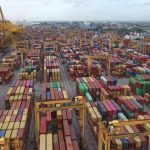The 8th session of the IMO Sub-Committee on Carriage of Cargoes and Containers (CCC 8) was held from 14 to 23 September 2022. CCC 8 finalized interim guidelines for ships using LPG as fuel, continued work on guidelines for hydrogen as fuel and started work on guidelines for ammonia as fuel.
Amendments to the IGF Code and the development of guidelines for low-flashpoint fuels
CCC 8 finalized Interim guidelines for the safety of ships using LPG fuels for approval at MSC 107 in June 2023. It continued the development of the draft Interim guidelines for the safety of ships using hydrogen as fuel, which are expected to be finalized in 2023. Only provisions for compressed and liquid hydrogen will be included at the present time. The Interim guidelines for the use of oil fuels with a flashpoint between 52°C and 60°C was not discussed in detail, but work will continue in a Correspondence Group reporting to CCC 9 in 2023.
Furthermore, CCC 8 agreed on issues to be considered for the regulatory development of guidelines for the safety of ammonia-fuelled ships. Work on the interim guidelines will continue in a Correspondence Group are scheduled to be finalized in 2024. The work plan for the development of new alternative fuels under the IGF Code was updated accordingly.
Various technical and editorial amendments to the IGF Code fuels were finalized for approval at MSC 107 in June 2023, such as:
- Definition of ships constructed on or after 1 January 2026
- Amendments to the provisions for bunkering manifolds and bunkering operations
- Clarified requirements related to the capacity of fuel tank’s pressure relief valves
- Clarified requirements for control of tank pressure and temperature
- Clarified requirements for single fuel installations redundancy and propulsion capability
- Clarified requirements for venting of segments upstream of gas consumers
- Clarified requirements design pressure of the outer pipe or duct of fuel systems
- Added requirement for portable dry powder extinguisher in the fuel preparation room
- Clarified hazardous area zone requirements
Review of the IGC Code
Due to the number and large scope of the proposed amendments to the IGC Code, it was agreed to compile and review these in a Correspondence Group reporting to CCC 9 in 2023 with the aim of developing a consolidated amendment proposal. The amendments will be further considered by CCC 9, aiming for adoption by 1 July 2026 and entry into force on 1 January 2028.
In addition to this, CCC 8 agreed to add a new IGC Code product named VOC Condensate, which is related to reducing vapour emissions during shuttle tanker operation. The product was included through a CCC Circular as an interim measure in advance, to be later included in the IGC Code revision.
Revision of the Interim recommendations for carriage of liquefied hydrogen in bulk
CCC 8 agreed to review the structure of the Interim recommendations for carriage of liquefied hydrogen in bulk (Resolution MSC.420(97)) for clarity and to provide flexibility for future expansion. A draft revised version will be developed in a Correspondence Group reporting to CCC 9 in 2023.
Amendments to the IMSBC Code and supplements
The following topics were discussed and forwarded to the Editorial and Technical Group (E&T) 37, to be held from 26 to 30 September 2022, for consideration and implementation in the draft amendment 07-23 of the IMSBC Code:
- New individual cargo schedules for celestine concentrate, celestine, crushed granodiorite fines, ground granulated blast furnace slag powder, and magnesite fines
- Alignment of the IMSBC Code with SOLAS on declaration of solid bulk density and proposal of an MSC Circular bringing the issue to the attention of stakeholders
- Amendments to MSC.1/Circ.1453/Rev.1 and MSC.1/Circ.1454/Rev.1 regarding the inclusion of the expression “dynamic separation”
- Alignment of the stabilization requirements for fish meal with the IMDG Code and classification as MHB (SH) instead of class 9
The draft amendment 07-23 to the IMSBC Code is expected to be adopted by MSC 107 in June 2023.
The following topics were sent to E&T 37 for further discussion, with a view to providing further advice to CCC 9:
- Substance identification number for solid bulk cargoes
- Classification of COAL and suitability of the N.4 test
- Number of spare charges for self-contained breathing apparatuses for apparatuses required solely by the IMSBC Code
- New individual cargo schedules for chemical gypsum powder and contaminated soil
- Amendments to the individual schedule for charcoal
Amendments to the IMDG Code and supplements
A proposal for amending provision 5.5.4 related to criteria for devices in use or intended for use during transport containing dangerous goods – such as data loggers, sensors and cargo trackers proposal – was agreed for the inclusion in the next amendment (42-24) of the IMDG Code.
The 42-24 amendment of the IMDG Code is expected to be adopted by MSC 108 in 2024.
Various new proposals for the next amendment of the IMDG Code were discussed and forwarded to the Editorial and Technical Group (E&T) 38, to be held in spring 2023, such as:
- Amendment of transport provisions for UN 1361 and 1362
- Limited quantity provisions for UN 2956 musk xylene
- Stowage of not otherwise specified substances of class 4.3
- Harmonization of SP 388 with the UN Model Regulations and further consequential amendments to SP 961.1 and SP 962.4
- Proposed amendments to the shipping conditions of seed cake
- Amendments to SP 964
- Definition of competent authority in terms of certification, approval and permits
- Amendments to 5.4.4 of the IMDG Code
- Amendments to the provisions of the IMDG Code to clarify the application of paragraph 2.10.2.7 thereof
- Amendments to paragraph 7.3.3.14 of the IMDG Code to clarify that the CTU Code is non-mandatory
- Proposed amendments to provision 7.6.2.8.4 to clarify arrangements for emergency access to ammonium nitrate when stowed under deck
- New proposals for stabilized substances
In view of the serious incidents caused by fires originating from vehicles, a Correspondence Group reporting to CCC 9 in 2023 will be established to review the transport provisions with a view to improve the carriage regulations and consider appropriate measures to address the hazards posed by the carriage of vehicles.
Unified Interpretations
CCC 8 agreed on the following Unified Interpretations, subject to adoption by MSC:
- Paragraphs 4.20.3.5, 4.20.3.6, 4.20.3.7, 5.13.2.5 and 13.3.5 of the IGC Code on the conduct of verifications and examinations required during the first full loading and unloading of the cargo
- Paragraphs 11.3.1, 11.4.1, 11.4.3 and 18.10.3.2 of the IGC Code on bunkering manifold arrangements fitted on LNG bunkering ships
- Part A-1, paragraph 9.2.2 of the IGF Code on the piping system for fuel transfer to consumers
- Section 5.8 of the IGF Code on the design of fuel preparation rooms not located on open deck
Recommendations
DNV recommends that customers note the development of interim guidelines for use of LPG, hydrogen and ammonia as fuel, as well as the various amendments to the IGF, IMDG and IMSBC Codes.
As CCC is a Sub-Committee, all decisions concerning rules, regulations and dates are subject to further consideration and approval by the Maritime Safety Committee (MSC).
Source: Hellenic Shipping News






